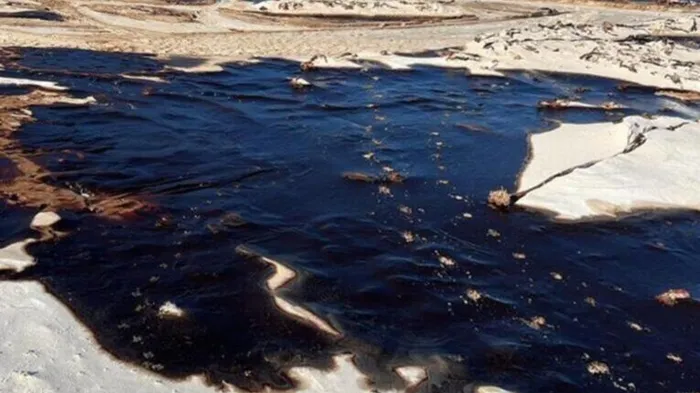Heavy metals in marine outfall a concern

A sample from a spill of thick, dark liquid on the Blue Flag Camps Bay Beach in March 2023 contained “significant” traces of aluminium, which is toxic to the marine environment, according to scientist Professor Leslie Petrik.
The City of Cape Town says there was a “slight” non-compliance with the amount of certain heavy metals present in the sewage being pumped out from its marine outfalls.
A quarterly meeting of the Permit Advisory Forum was held at the council chambers of the Civic Centre on August 2, to engage public stakeholders in the review of sewage discharge permit conditions for the Camps Bay, Hout Bay and Green Point marine outfalls.
Last year, former Department of Forestry, Fisheries and the Environment (DFFE) Minister Barbara Creecy stated that the City failed to inform interested parties that the permits had been obtained or to make a public notice about sewage release permits in 2019 and 2022, (“Minister pulls chain on City’s poo permits”, June 22, 2023).
She had overturned her decision to issue Coastal Water Discharge Permits, which allow the City to discharge sewage from marine outfalls into the sea.
On April 26 this year, the City of Cape Town's Water and Sanitation Directorate held the first public quarterly meeting of the Permit Advisory Forum.
The City recommended combining the Permit Advisory Forum functions into the present Section 80 Advisory Committee, which is responsible for monitoring ongoing compliance.
However, the City, via a statement on August 14, acknowledged that there is slight non-compliance with certain reported metrics, like amounts of cadmium, copper, and zinc and that this would be consulted on with the DFFE.
According to Dr Cleeve Robertson, CEO of the National Sea Rescue Institute, heavy metals are a telltale sign of a major issue.
“Although we are not drinking sea water other, plants and animals are and they then get transported along a food chain. You can look up the health risks related to these chemicals. I think we get distracted by detail, the big issue is that we dump a billion litres of sewage into the environment every day without cleaning it. What do we expect. That's the challenge, it needs to be processed,” Dr Robertson said.
In addition to the metals listed, there are more toxic substances, according to Professor Leslie Petrik, group leader of environmental and nano sciences at the University of the Western Cape (UWC), an issue that was raised last year (“Camps Bay spill toxic to marine life, says scientist, July 20, 2023).
“The City aims to meet only the most limited quality parameters, but actually fails to produce rigorous scientific evidence of the real impact of the sewage discharges into a marine protected environment. The criteria they use to measure compliance are outdated, and do not take into account or report on the numerous other toxic components, apart from a few metals, in the daily sewage discharge,” Professor Petrik said.
After more than 10 years of kayaking along the Atlantic seaboard, David Katz, a marine conservationist, said the environmental damage is getting worse.
“The increase in waste has been exponential, I’ve noticed that it’s much worse after lockdown (2020). Sewage, plastic, it’s just increased, and it’s getting worse. I keep hearing the words engagement and working together but I’m not feeling it. It’s the same information over and over again, there’s nothing groundbreaking,” Mr Katz said.
Mr Katz attended the Permit Advisory Forum meeting and said the City intends to test the sea urchins that are in close proximity to the marine outfall plants. He claims that the quarterly testing schedule is an anti-scientific method of addressing this issue.
“It would be nice if the City could take people to the grid system, we don’t have access, let’s check it out and explain how it works. It’s no use waiting for three months to find out what the data is or if a solution is approved, it’s always a waiting period. The science is out there to use and we have to put it to good use, we know what happened in France (Olympics), in the Seine River, we see what’s happening in the reefs of Australia. Yes it will cost money but the longer we leave it the more it will cost,” he said.
The City and the DFFE requested an extension for their response to the Atlantic Sun.
Related Topics: